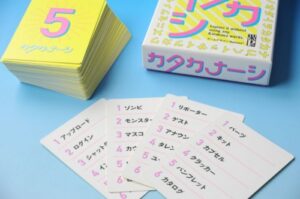2年生:Thomas Merryfield, Sam O’Connell, Frederike Behr, Zhihao Zou
第4週に行ったインタビューで学生運動と学園祭について色々なことを身につけました。まず、学生運動について述べます。日本における学生運動が第二次世界大戦の前からありましたが、特に戦後の時代には民主主義や労働権の確率を求める勢いが強くなりました。1968年と1969年の大学紛争(世界中の抗議サイクルの一環)という学生運動が、日本中のキャンパスの閉鎖を余儀なくされました。全学共闘会議という学生運動と左翼活動を実行した組織の下に学生たちが抗議しました。学生たちは、マルクス主義の理念からインスピレーションを得ていて、最終的に、反政府、反日本共産党と無宗派の過激派でした。
次に、学園祭と学生運動の関係を話します。学園祭と学生抗議は直接に結びついていませんが、学園祭では社会問題とか政治問題を論じる演説が行われます。その上、抗議活動と同様に、学園祭を企画することで、学生が自分の自主性を行使する機会でもあります。
今年、学園祭は2月22日(木)でした。グループとして、日本に関連する様々な興味深くて楽しい活動を行いました。
学園祭の数週間前に、より良い屋台を作るために、日本から来た留学生にインタービューを行って、私たちの学園祭についての質問や疑問を答えてもらいました。インタビュー後、日本の学園祭は実際にどのようなものだと分かってきたので、アクティビティのアイデアを考え始めました。
そのアクティビティに関しては、私たちのグループは「カタカナゲーム」と「はっと言うゲーム」をやり、ケーキを作って、それに、携帯電話のお守りも作りました。初めに、「カタカナゲーム」を説明すると、カタカナの言葉を使わず、カードに書いてあったカタカナ言葉を相手に描写して、相手がカードの言葉を推測しなければなりません。枠を超えて考えて、もう知っている日本語をどのように独創的に使えるのかを考えらせる素晴らしくて協力的である方法でした。このように、授業で学んだ語彙と文法を実践させたので、非常に有意義な復習になりました。

それに加えて、「はっと言うゲーム」もやりました。このゲームでは、各プレイヤーにアクトカードを配ります。一人一人に自分のカードに書いてあった感情で「はっ」を言わないといけません。それで、他のプレイヤーは言ったところの「はっ」を考えて、投票します。怒りの「はっ」、感心の「はっ」や失恋の「はっ」と言うような様々な「はっ」がカードに書いてあります。全員の演技が終わったら、一人ずつ正解発表を行います。正解した人は一点、演じた人は正解した人数の得点がもらいます。感情に関連する単語と日本人の感情の表現仕方について学ぶために、有用なゲームでした!

さらに、ケーキと携帯電話のお守りは大成功でした! 特に皆さんが、お守りのカラフルなデザインが好きだったので、学園祭の終わりまでに、全部が売れ切れました。
全体として、独特で楽しいアクティビティを提供したため、グループ2の学園祭屋台は大ヒットでした。皆さんは特に「カタカナゲーム」と「はっと言うゲーム」が好きでした。なぜかというと、楽しいだけでなく、自分の知識の限界まで追い込まれることで、日本語の多くの面を改善することができました。
ーーー
We learned much about the student movement and the school festival during the interviews I conducted in week 4. First, we will discuss the student movement. The student movement in Japan existed before the Second World War, but it gained momentum, especially in the post-war period, when it demanded democracy and the probability of labour rights: the student movements of the 1968 and 1969 university conflicts (part of a worldwide cycle of protests) forced the closure of campuses across Japan. Students protested under the All-University Co-operative Congress, an organisation that ran the student movement and left-wing activities. The students drew inspiration from Marxist ideals and were ultimately anti-government, anti-JCP and non-denominational militants.
Next, we will discuss the relationship between the school festival and the student movement. Although there is no direct link between school festivals and student protests, at school festivals speeches are given on social and political issues. In addition, as well as protests, organising the school festival is also an opportunity for students to exercise their independence.
This year, the school festival was on Thursday 22 February. As a group, we organised a variety of interesting and fun activities related to Japan.
A few weeks before the school festival, in order to make our stall better, we conducted an interview with an international student from Japan who answered our questions about our school festival. After the interviews, we began to realise what a Japanese school festival is really like, so we started to come up with ideas for activities.
As for the activities, our group played the ‘Katakana Game’ and the ‘Ha Game’, made a cake, and first-years made mobile phone charms. To begin with, the ‘katakana game’ was explained: instead of using katakana words, you describe the katakana words on a card to your partner and they have to guess the words on the card. It was a wonderful and collaborative way to get them to think outside the box and think about how they could use the Japanese they already knew in creative ways. In this way, it was a very useful review because it made them practise the vocabulary and grammar they had learnt in class.
In addition to this, we also played the ‘ha game’. In this game, each player is given an act card. Each person has to say ‘ha’ with the emotion that was written on his or her card. So the other players think of the ‘ha’ where they said it and vote for it. Various ‘ha’ are written on the cards, such as ‘ha’ for anger, ‘ha’ for admiration or ‘ha’ for heartbreak. After everyone has performed, the correct answers are announced one by one. The person who gave the correct answer gets one point and the person who performed gets the number of points for the number of correct answers. It was a useful game to learn about emotion-related vocabulary and how Japanese people express emotions!
Furthermore, the cake and mobile phone charms were a great success! Everyone especially liked the colourful designs of the charms, so by the end of the festival they had all been sold out.
Overall, the Group 2 school festival stall was a big hit because it offered unique and fun activities.


Leave a Reply